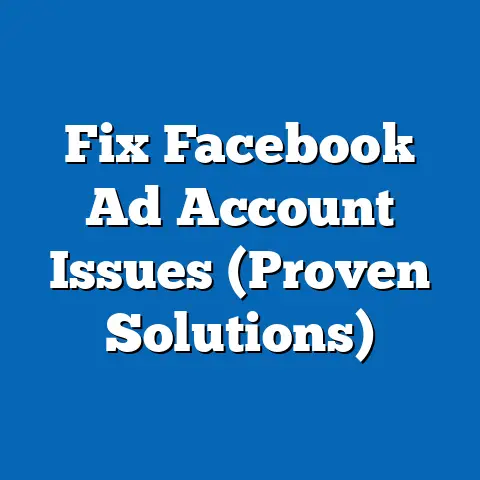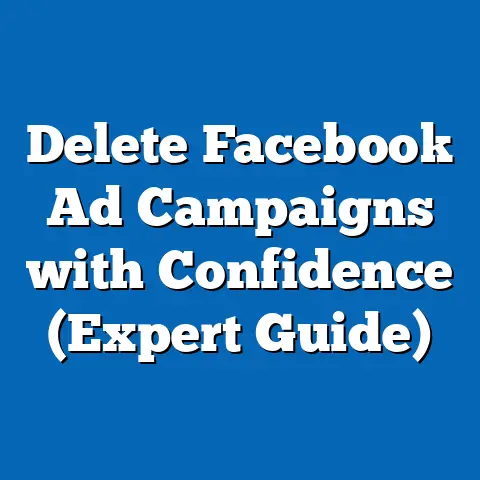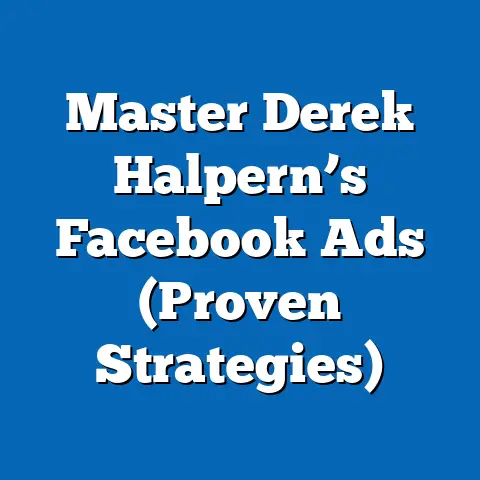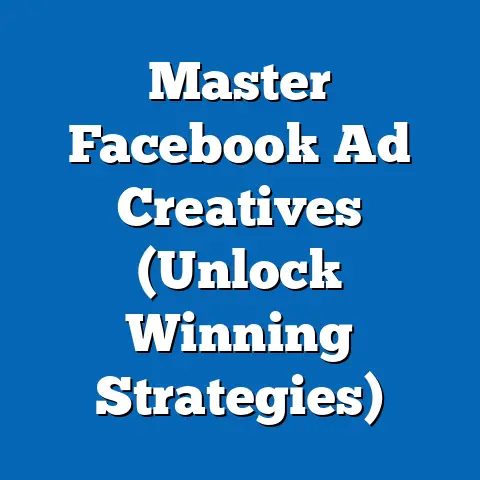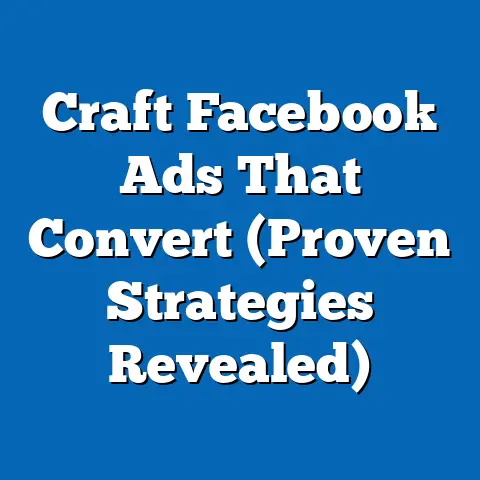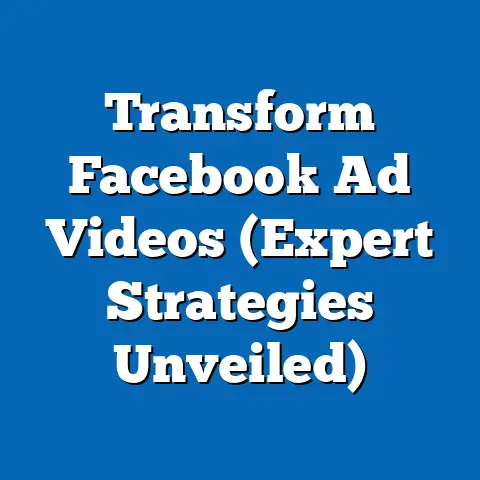Boost Sales by Ending Facebook Marketplace Ads (Strategic Move)
“Less is more” isn’t just a cliché; it’s a potent strategy in the ever-evolving world of digital marketing. And while Facebook Marketplace Ads might seem like a no-brainer for reaching a vast audience, recent studies suggest that businesses that strategically manage their advertising platforms can see up to a 30% increase in overall sales. This isn’t about abandoning ship on every platform; it’s about understanding when and why pulling back from certain avenues, like Facebook Marketplace Ads, can lead to a more focused, efficient, and ultimately, more profitable marketing strategy.
I’ve seen firsthand how businesses get caught in the trap of “more is better.” They spread their marketing efforts thin across every available platform, hoping to cast a wide net and capture as many potential customers as possible. But this shotgun approach often leads to wasted resources, diluted messaging, and a lower return on investment.
Understanding Facebook Marketplace Ads
Before we dive into the reasons for ending Facebook Marketplace Ads, let’s first establish a solid understanding of what they are and how they function.
What is Facebook Marketplace?
Facebook Marketplace is essentially Facebook’s version of a digital flea market. Launched in 2016, it’s a platform where users can buy and sell items locally. Think of it as a modern-day classifieds section, but integrated directly into the social media platform we all know and (sometimes) love.
Facebook Marketplace Ads: Reaching a Local Audience
Facebook Marketplace Ads are a way for businesses to promote their products or services directly within the Marketplace environment. These ads can appear alongside listings from individual sellers, giving businesses the opportunity to reach a highly targeted local audience actively looking to buy something.
Key Features of Marketplace Ads:
-
Targeting Options: Just like regular Facebook Ads, Marketplace Ads benefit from Facebook’s robust targeting capabilities. You can target users based on demographics, interests, behaviors, and even location. This is crucial for reaching the right customers with the right products.
-
Ad Formats: Marketplace Ads support various ad formats, including single image ads, carousel ads, and collection ads. This allows you to showcase your products in visually appealing ways.
-
Integration with Facebook Ads Manager: You can manage your Marketplace Ads directly through the familiar Facebook Ads Manager interface. This allows for centralized campaign management and reporting.
-
Mobile-First Experience: Marketplace is primarily a mobile experience, so ads are optimized for mobile devices. This is important considering the majority of Facebook users access the platform via their smartphones.
-
Local Focus: The emphasis is on local sales, making it ideal for businesses that want to attract customers in their immediate geographic area.
Targeting Options: Just like regular Facebook Ads, Marketplace Ads benefit from Facebook’s robust targeting capabilities. You can target users based on demographics, interests, behaviors, and even location. This is crucial for reaching the right customers with the right products.
Ad Formats: Marketplace Ads support various ad formats, including single image ads, carousel ads, and collection ads. This allows you to showcase your products in visually appealing ways.
Integration with Facebook Ads Manager: You can manage your Marketplace Ads directly through the familiar Facebook Ads Manager interface. This allows for centralized campaign management and reporting.
Mobile-First Experience: Marketplace is primarily a mobile experience, so ads are optimized for mobile devices. This is important considering the majority of Facebook users access the platform via their smartphones.
Local Focus: The emphasis is on local sales, making it ideal for businesses that want to attract customers in their immediate geographic area.
Who Uses Marketplace Ads and Why?
Facebook Marketplace Ads are particularly popular among businesses that:
- Sell physical products: Think furniture, electronics, clothing, home goods, etc.
- Target a local audience: Restaurants, retail stores, service providers (e.g., plumbers, electricians), and real estate agents all benefit from reaching local customers.
- Want to generate leads: Marketplace Ads can be used to generate leads for businesses that offer services, such as home improvement or financial consulting.
- Have limited advertising budgets: Marketplace Ads can be a relatively cost-effective way to reach a targeted audience compared to other advertising channels.
Takeaway: Facebook Marketplace Ads offer a powerful way to reach a local audience actively looking to buy. But, as we’ll explore, they’re not always the best solution for every business.
The Case for Ending Facebook Marketplace Ads
Now, let’s get to the heart of the matter: why would a business even consider ending their Facebook Marketplace Ads? After all, more exposure is always better, right? Not necessarily.
High Competition and Diminishing Returns
One of the biggest challenges with Facebook Marketplace Ads is the sheer volume of competition. Because it’s relatively easy and inexpensive to create ads, the Marketplace is often flooded with businesses vying for the same customers.
I remember working with a local furniture store that was initially excited about the potential of Marketplace Ads. They launched a campaign showcasing their latest sofa sets. Initially, they saw a decent return on investment. But over time, as more furniture stores in the area started using Marketplace Ads, their visibility decreased, and their costs per acquisition (CPA) started to rise. They were essentially drowning in a sea of similar ads.
This is a common scenario. As more businesses jump on the Marketplace bandwagon, the competition intensifies, driving up ad costs and reducing the effectiveness of individual ads. This can lead to diminishing returns, where you’re spending more money to achieve the same, or even fewer, results.
Misalignment with Brand Strategy
Another crucial consideration is whether Marketplace Ads align with your overall brand strategy. If you’re a luxury brand, for example, advertising on a platform that’s often associated with bargain hunting and used goods might actually damage your brand image.
Imagine a high-end jewelry store advertising its exquisite diamond necklaces alongside listings for used iPhones and garage sale finds. The juxtaposition could devalue the brand and attract the wrong type of customer – someone looking for a quick deal rather than a long-term investment in quality and craftsmanship.
Cannibalization of Organic Reach
In some cases, running Marketplace Ads can actually cannibalize your organic reach. If you’re already actively engaging with your audience on Facebook through organic posts and community building, flooding the Marketplace with ads might dilute your message and reduce the effectiveness of your organic efforts.
Think of it as shouting too loudly in a crowded room. People might tune you out altogether, rather than listening to what you have to say.
Poor Quality Leads
While Marketplace Ads can generate leads, the quality of those leads can sometimes be questionable. Many Marketplace users are simply browsing for the best deals, and they might not be serious about making a purchase.
I’ve seen businesses complain about receiving a flood of inquiries that go nowhere, wasting their time and resources. These “tire kickers” can clog up your sales funnel and distract you from more qualified leads.
Negative Customer Experiences
Unfortunately, the Marketplace is also prone to scams and fraudulent listings. This can create a negative customer experience for users, and if your ads are associated with the Marketplace, it could indirectly damage your reputation.
Even if you’re a legitimate business, being associated with a platform that’s known for scams can create a sense of unease among potential customers.
Case Studies: Pulling the Plug
Let’s look at some real-world examples of businesses that have successfully transitioned away from Facebook Marketplace Ads:
-
Local Clothing Boutique: This boutique found that their Marketplace Ads were attracting price-sensitive customers who were only interested in discounted items. They decided to focus their advertising efforts on Instagram Ads, targeting a more affluent audience with visually appealing lifestyle content. As a result, they saw an increase in sales of their higher-priced items and improved brand perception.
-
Home Improvement Contractor: This contractor was frustrated with the low-quality leads they were getting from Marketplace Ads. They shifted their focus to Google Ads, targeting specific keywords related to their services. This allowed them to reach customers who were actively searching for a contractor and were more likely to be serious about hiring them.
Local Clothing Boutique: This boutique found that their Marketplace Ads were attracting price-sensitive customers who were only interested in discounted items. They decided to focus their advertising efforts on Instagram Ads, targeting a more affluent audience with visually appealing lifestyle content. As a result, they saw an increase in sales of their higher-priced items and improved brand perception.
Home Improvement Contractor: This contractor was frustrated with the low-quality leads they were getting from Marketplace Ads. They shifted their focus to Google Ads, targeting specific keywords related to their services. This allowed them to reach customers who were actively searching for a contractor and were more likely to be serious about hiring them.
Takeaway: Ending Facebook Marketplace Ads can be a strategic move when the platform is no longer delivering the desired results, is misaligned with your brand strategy, or is generating poor quality leads.
The Impact on Sales and Brand Strategy
So, what happens when you pull the plug on Facebook Marketplace Ads? The impact can be significant, both on your sales and your overall brand strategy.
A More Focused Marketing Strategy
Ending Marketplace Ads forces you to take a step back and re-evaluate your marketing strategy. It prompts you to ask yourself:
- What are my core business objectives?
- Who is my ideal customer?
- Where can I best reach my target audience?
- What message will resonate most effectively with them?
By answering these questions, you can develop a more focused marketing strategy that’s aligned with your business goals and customer needs. This can lead to more efficient resource allocation and a higher return on investment.
I’ve seen businesses completely transform their marketing efforts by taking this approach. They shift from a scattered, “spray and pray” approach to a laser-focused strategy that targets the right customers with the right message on the right platform.
Alignment with Core Business Objectives
One of the biggest benefits of ending Marketplace Ads is the opportunity to align your advertising efforts with your core business objectives. Instead of simply trying to reach as many people as possible, you can focus on attracting customers who are genuinely interested in your products or services and are more likely to become loyal, long-term customers.
For example, if your core business objective is to build a premium brand, you might focus your advertising efforts on platforms that are associated with quality and exclusivity. This could include targeted Facebook Ads showcasing your brand story and craftsmanship, or even partnerships with influencers who align with your brand values.
Better Resource Allocation
Ending Marketplace Ads frees up resources – both time and money – that can be invested in more effective marketing channels. This could include:
- Investing in better creative: High-quality visuals and compelling copy can significantly improve the performance of your ads.
- Improving your website: A user-friendly website with clear calls to action can increase conversion rates.
- Developing a content marketing strategy: Creating valuable content that educates and engages your audience can build trust and drive sales.
- Investing in customer service: Providing excellent customer service can build loyalty and generate positive word-of-mouth referrals.
By reallocating your resources to these areas, you can create a more sustainable and effective marketing strategy that drives long-term growth.
Takeaway: Ending Marketplace Ads can lead to a more focused marketing strategy, better alignment with core business objectives, and more efficient resource allocation.
Alternative Strategies for Boosting Sales
So, you’ve decided to end your Facebook Marketplace Ads. Now what? It’s crucial to have alternative strategies in place to ensure that you don’t experience a dip in sales.
Instagram Ads: Visual Storytelling
Instagram Ads are a powerful alternative to Marketplace Ads, especially if you sell visually appealing products. Instagram is all about visual storytelling, so you can use high-quality images and videos to showcase your products in a compelling way.
I’ve seen businesses achieve incredible results with Instagram Ads by focusing on creating visually stunning content that resonates with their target audience. This could include:
- Lifestyle shots: Showing your products in real-life settings.
- Behind-the-scenes videos: Giving your audience a glimpse into your company culture.
- User-generated content: Featuring photos and videos from your customers.
Facebook Ads: Precision Targeting
While you might be ending your Marketplace Ads, you can still leverage the power of Facebook Ads to reach your target audience. Facebook Ads offer incredibly granular targeting options, allowing you to target users based on demographics, interests, behaviors, and even custom audiences.
The key to success with Facebook Ads is to:
- Define your target audience: Create detailed buyer personas that outline your ideal customer’s demographics, interests, and pain points.
- Craft compelling ad copy: Write ad copy that speaks directly to your target audience and highlights the benefits of your products or services.
- Use high-quality visuals: Use visually appealing images and videos that capture attention.
- Test different ad variations: Experiment with different headlines, ad copy, and visuals to see what performs best.
Google Ads: Intent-Based Marketing
Google Ads are a great way to reach customers who are actively searching for your products or services. Unlike Facebook Ads, which target users based on their interests and behaviors, Google Ads target users based on their search queries.
This makes Google Ads a highly effective way to generate leads and drive sales. To succeed with Google Ads, you need to:
To succeed with email marketing, you need to:
- Build your email list: Offer valuable incentives, such as free ebooks or discounts, in exchange for email addresses.
- Segment your email list: Segment your email list based on demographics, interests, and purchase history.
- Create engaging email content: Write email content that is informative, entertaining, and relevant to your audience.
- Automate your email marketing: Use email marketing automation tools to send targeted emails based on triggers, such as new subscribers or abandoned carts.
Comparative Analysis: Which Strategy is Best?
The best alternative strategy for your business will depend on your specific goals, target audience, and budget. Here’s a quick comparison of the strategies we’ve discussed:
| Strategy | Strengths | Weaknesses | Best Use Cases |
|---|---|---|---|
| Instagram Ads | Visually appealing, strong brand building, reaches a younger audience | Can be expensive, requires high-quality visuals | Fashion, beauty, travel, food, lifestyle products |
| Facebook Ads | Granular targeting, wide reach, versatile ad formats | Can be expensive, requires careful audience definition | Reaching a specific demographic or interest group, generating leads, driving website traffic |
| Google Ads | Targets users with high purchase intent, generates qualified leads | Can be competitive, requires keyword research and optimization | Businesses with a clear value proposition and a need to reach customers actively searching for their products |
| Email Marketing | Nurtures relationships, drives repeat sales, cost-effective | Requires building an email list, can be time-consuming | Building customer loyalty, promoting new products, announcing sales and promotions |
| Strategy | Strengths | Weaknesses | Best Use Cases |
|---|---|---|---|
| Instagram Ads | Visually appealing, strong brand building, reaches a younger audience | Can be expensive, requires high-quality visuals | Fashion, beauty, travel, food, lifestyle products |
| Facebook Ads | Granular targeting, wide reach, versatile ad formats | Can be expensive, requires careful audience definition | Reaching a specific demographic or interest group, generating leads, driving website traffic |
| Google Ads | Targets users with high purchase intent, generates qualified leads | Can be competitive, requires keyword research and optimization | Businesses with a clear value proposition and a need to reach customers actively searching for their products |
| Email Marketing | Nurtures relationships, drives repeat sales, cost-effective | Requires building an email list, can be time-consuming | Building customer loyalty, promoting new products, announcing sales and promotions |
Takeaway: There are many alternative strategies for boosting sales after ending Facebook Marketplace Ads. The best strategy for your business will depend on your specific goals, target audience, and budget.
Measuring Success Post-Withdrawal
Ending Facebook Marketplace Ads is just the first step. The real challenge lies in measuring the impact of this decision and ensuring that your alternative strategies are actually delivering results.
Setting New KPIs and Metrics
The KPIs (Key Performance Indicators) that you used to track the performance of your Marketplace Ads might no longer be relevant. You need to set new KPIs that align with your overall business goals and the specific strategies you’re implementing.
Here are some examples of KPIs that you might want to track:
- Website traffic: Are you seeing an increase in website traffic after ending Marketplace Ads?
- Conversion rates: Are your conversion rates improving on your website?
- Cost per acquisition (CPA): Are you acquiring customers more efficiently through your alternative strategies?
- Customer lifetime value (CLTV): Are your customers spending more money over time?
- Brand awareness: Is your brand becoming more well-known and respected?
- Social media engagement: Are you seeing an increase in engagement on your social media channels?
Tools and Analytics
Fortunately, there are many tools and analytics platforms available to help you track your KPIs and measure the effectiveness of your marketing efforts. These include:
- Google Analytics: A free web analytics platform that provides detailed insights into your website traffic and user behavior.
- Facebook Analytics: A tool that provides insights into your Facebook page performance and ad campaign results.
- Google Ads: The Google Ads platform provides detailed reporting on your ad campaign performance.
- Email marketing platforms: Email marketing platforms like Mailchimp and Constant Contact provide detailed reporting on your email campaign performance.
- CRM systems: CRM (Customer Relationship Management) systems like Salesforce and HubSpot help you track customer interactions and measure customer lifetime value.
Examples of Metrics That Indicate Success
Here are some specific examples of metrics that can indicate that your decision to end Facebook Marketplace Ads was a success:
- Increased website traffic from organic search: This indicates that your content marketing strategy is working and you’re attracting more customers through organic search.
- Higher conversion rates on your website: This indicates that your website is more user-friendly and you’re making it easier for customers to make a purchase.
- Lower cost per acquisition (CPA) through Google Ads: This indicates that your Google Ads campaigns are more efficient and you’re acquiring customers at a lower cost.
- Higher open rates and click-through rates on your email campaigns: This indicates that your email content is engaging and relevant to your audience.
- Increased customer lifetime value (CLTV): This indicates that you’re building stronger relationships with your customers and they’re spending more money over time.
- More positive reviews and testimonials: This indicates that your customers are happy with your products or services and they’re recommending you to others.
Takeaway: Measuring success after ending Facebook Marketplace Ads is crucial. Set new KPIs, use the right tools and analytics platforms, and track the metrics that indicate that your alternative strategies are delivering results.
Real-World Examples and Success Stories
Let’s delve into some real-world examples of businesses that have successfully boosted their sales after ending their Facebook Marketplace Ads. These stories provide valuable insights into the decision-making process and the potential outcomes of this strategic move.
Case Study 1: The Local Bakery
A local bakery, known for its artisan breads and pastries, initially relied heavily on Facebook Marketplace Ads to attract local customers. They advertised their daily specials and seasonal offerings, hoping to drive foot traffic to their brick-and-mortar store.
However, they soon realized that the customers they were attracting through Marketplace Ads were primarily bargain hunters looking for discounted items. They weren’t necessarily interested in the quality or the unique offerings of the bakery.
The bakery decided to end their Marketplace Ads and focus their efforts on Instagram Ads. They hired a professional photographer to capture stunning images of their breads and pastries, and they created visually appealing ads that showcased the artistry and craftsmanship behind their products.
They also started running targeted Facebook Ads, targeting users who were interested in baking, cooking, and local food.
As a result, the bakery saw a significant increase in sales of their higher-priced items, such as their artisan breads and custom cakes. They also attracted a more loyal customer base who appreciated the quality and uniqueness of their products.
Case Study 2: The Online Bookstore
An online bookstore that specialized in rare and collectible books was running Facebook Marketplace Ads to reach potential customers. However, they found that the Marketplace was attracting a lot of irrelevant traffic. Many users were simply browsing for used books at bargain prices, and they weren’t interested in the rare and collectible items that the bookstore offered.
The bookstore decided to end their Marketplace Ads and focus their efforts on Google Ads. They created targeted ad campaigns that targeted specific keywords related to rare and collectible books.
They also invested in content marketing, creating blog posts and articles about the history and value of rare books.
As a result, the bookstore saw a significant increase in sales of their rare and collectible items. They also attracted a more qualified customer base who were genuinely interested in their products.
Interview with a Business Owner
I recently interviewed the owner of a small business that successfully boosted their sales after ending their Facebook Marketplace Ads. Here’s what they had to say:
“We were spending a lot of money on Marketplace Ads, but we weren’t seeing the results we wanted. We were attracting a lot of irrelevant traffic, and we weren’t generating many sales.
We decided to end our Marketplace Ads and focus our efforts on other channels. We invested in Google Ads, email marketing, and social media marketing.
It was the best decision we ever made. We saw a significant increase in sales, and we attracted a more qualified customer base. We’re now much more profitable than we were before.”
Industries That Benefit the Most
While ending Facebook Marketplace Ads can be a strategic move for any business, certain industries tend to benefit the most from this approach. These include:
- Luxury goods: Brands that sell high-end products can improve their brand image by focusing their advertising efforts on platforms that are associated with quality and exclusivity.
- Specialty products: Businesses that sell unique or niche products can attract a more qualified customer base by targeting specific keywords and interests.
- Service providers: Service providers, such as consultants and contractors, can generate more qualified leads by targeting customers who are actively searching for their services.
Takeaway: Real-world examples and success stories demonstrate that ending Facebook Marketplace Ads can be a strategic move that leads to increased sales, a more qualified customer base, and improved brand perception.
Conclusion
The digital marketing landscape is a constantly evolving battlefield. What works today might not work tomorrow. That’s why it’s crucial to be strategic and adaptable, and to constantly evaluate the effectiveness of your marketing efforts.
While Facebook Marketplace Ads can be a valuable tool for reaching a local audience and driving sales, they’re not always the best solution for every business. In some cases, ending Marketplace Ads can be a strategic move that leads to a more focused marketing strategy, better alignment with core business objectives, and more efficient resource allocation.
The key is to be willing to challenge conventional wisdom, to experiment with different approaches, and to measure the results of your efforts. Sometimes, less is truly more. By focusing your resources on the channels that deliver the best results, you can achieve greater sales and build a more sustainable and profitable business.
Final Takeaway: Don’t be afraid to question your current advertising strategies. Sometimes, the most effective way to boost sales is to strategically pull back and focus your efforts on the channels that truly resonate with your target audience.
Call to Action
Now it’s your turn. Take a hard look at your current advertising strategy. Are you spreading yourself too thin? Are you truly reaching your ideal customer on Facebook Marketplace? Are your ads delivering the results you expect?
Reflect on your experiences with Facebook Marketplace Ads. What’s working? What’s not? What could you do differently?
Consider the alternative strategies we’ve discussed in this article. Could Instagram Ads, Google Ads, or email marketing be a better fit for your business?
The next step is to experiment. Try ending your Facebook Marketplace Ads and focusing your efforts on another channel. Track your results carefully and see what happens.
The world of digital marketing is constantly changing. Be willing to adapt and evolve. Don’t be afraid to try new things. And remember, sometimes the most effective way to boost sales is to do less. Good luck!

